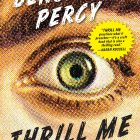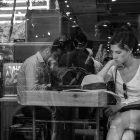The Best Short Story I Read in a Lit Mag This Week: “Away” by Karin Lin-Greenberg

Yuval Noah Harari argues in his book Sapiens: A Brief History of Humankind that much of humankind’s success as a species is owed to its ability to create fictions. Harari focuses primarily on large-scale, societal fictions, say the nation or the corporation. In “Away” (Green Mountains Review), Karin Lin-Greenberg explores our smaller, more personal fictions, and the various ways we use them to aid us in our day-to-day lives.
Lin-Greenberg begins the story by immediately asking us to question how close to reality this particular story will be.
“When the inflatable bouncy castle I’m jumping in with a handful of five-year-olds is lifted off the ground by a gust of wind, I think of my cousin Garnet and her story of being snatched by a hawk.”
Viral video hoaxes aside, kids aren’t snatched up by hawks, and it would take an enormous a gust of wind to pick up a bouncy castle filled with five-year-olds (and the narrator, who we find is eighteen). So are we in the realm of magical realism? The narrator quickly answers that by flashing back to her cousin Garnet’s story—about a hawk snatching her and flying her away when she was three—as told to the narrator and a group of other kids at summer camp.
“Here’s a scar from the talons,” she said, pointing to her shoulder, and the Arrowhead boys leaned in close to look, and I shook my head because the scar was not from talons but from her cat, Marie Curie, that she tried to dress up as Martha Washington to make a video for some homeschool history project… I waited for the other kids to laugh at her story, but no one did, and Victor, one of Arrowheads, said, “So cool. We should call you Garnet Hawk,” and then everyone called her that for the rest of the summer, in an impressed way as if she was someone really special.”
The narrator is furious, not because the hawk story is fiction and the kids don’t realize it, but because of the power it gives her cousin. Garnet is a homeschooled kid from the Midwest, while the narrator—a privileged New Yorker—feels certain that she deserves to be the cool kid at camp. The well-told lie doesn’t just turn Garnet into someone “really special,” it gives her an entirely new name and identity that the narrator can’t compete with.
Lin-Greenberg continues in backstory—that question of the bouncy castle still unanswered—outlining the parallel paths of the narrator and Garnet. While the narrator does just fine in school—A-minus average, debate team, leadership, etc.—she’s continually outshined by Garnet. By senior year, the narrator is compiling rejection letters while Garnet is getting attention from the best universities in the country. Notice how the narrator dismisses this.
“I tried to convince myself that Garnet got in because she was homeschooled and from Kansas, and colleges were desperate to recruit intelligent people from Kansas, and I was from New York, which was filled with overachievers and even dumb rich kids whose parents paid for them to take Princeton Review courses time after time until they knew all the tricks to getting good scores on the SATs, so the admissions standards for someone like me were higher than for someone like Garnet. Plus, since Garnet didn’t go to school, she had all this time to learn to juggle and make cheese and weave tapestries, useless skills that would make her look interesting to college admissions committees.”
At first the narrator is furious at Garnet for making up stories to prove she’s special; now she’s making up stories to try and convince herself that Garnet isn’t special. But Lin-Greenberg reveals a slight character change here in the word tried. The narrator is no longer convinced that she’s better than her cousin. Her confidence is beginning to fail as the fictions she’s told herself about the world aren’t holding up to reality.
We find that the narrator doesn’t get into any of the schools. Her rage against Garnet grows. But further cracks in her confidence begin to show.
“I told my mother that I thought Garnet was a pathological liar and her lies were going to eventually catch up with her, but my mother said, “Have you ever thought about how Garnet’s lies are a way to comfort herself? It’s not exactly easy being Garnet.”
Mother knows best. Implicit, of course, is that Garnet isn’t the only one lying to comfort herself. You could argue that the characters are a mirror to each other, each representing different sorts of privilege: the narrator in terms of upbringing and Garnet in terms of talent.
Lin-Greenberg returns us to the bouncy castle, absent from the story since that first line. The narrator, ashamed at not getting into other schools, not knowing what to do next, takes a baby-sitting job and settles in for a year living at home and preparing for college admissions all over again. She’s having fun in the bouncy castle with the kids, when something goes wrong. She looks outside and they’re flying high above the trees and houses.
“I think of the black-and-white spinning house in The Wizard of Oz and of Kansas and of Garnet and her story about being lifted by the hawk and how that story transformed her into something different from a scared, friendless homeschooled kid almost two-thousand miles from home, and I think about her story about her father’s backyard yurt as a sociological experiment and how it maybe makes her feel better to lie than to think about her parents’ impending divorce. We are up and twisting away, and I am scared and unsure of what will happen next, but I pull the kids closer to me, smile, and say in a steady voice, “Aren’t we lucky that Mr. and Mrs. Shaver rented this flying castle ride? Aren’t you excited to see where we’ll go?”
Lin-Greenberg brings us full circle. The narrator is now humbled to the point where she is where Garnet was all those years ago at camp: making up her own fantastic stories in an attempt to transform herself into something different that she is.
And this, of course, is what we all do. I don’t think it’s necessarily a bad thing. Harari might argue that these desperate fictions are in fact what make humankind special.



